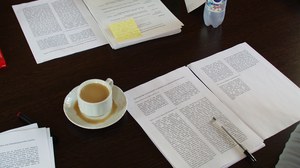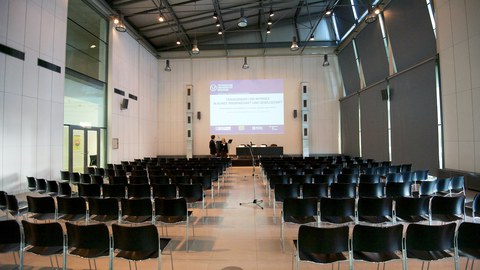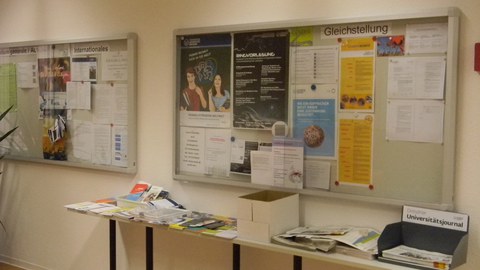Studying English Literature
Our teaching focuses on the mediation of sound analytical and interpretive basic skills as well as on an adequate theorization and in-depth knowledge about literary periods and texts. Studies in English Literature comprise all genres and literature from the 16th to 21st century. Additionally, we teach intercultural as well as (inter)medial competences as well as the most important analytic methods.
Academic Orientation of the Chair
The goal of teaching in the department of English Literary Studies is to move beyond an excellent knowledge of primary texts as well as proficiencies in literary and cultural history in order to highlight connections and discursive intersections between Literary Studies on the one hand and Cultural, Media, and Gender Studies, as well as Philosophy and Aesthetics on the other. In doing so, the interdependence and the 'intertwinedness' of the various disciplines is gradually elucidated (after all, Literary Studies always invariably includes aspects of Cultural and Media Studies, Semiotics and Linguistics). Our teaching, thus, favours an approach based on a broad media concept, which functions as a bridge between the disciplines, and on a deconstructivist view on writing. This approach asks how literary texts (and the arts in their totality) produce a particular brand of knowledge.
The Chair of English Literature Studies supports and teaches narratological/structuralist, discourse-analytical, semiotic, socio-historical/contextual, psychoanalytic, postcolonial, constructivist/deconstructivist/post-structuralist, phenomenological, media-theoretical and film-theoretical concepts and approaches, as well as gender and masculinity studies.
On the one hand, this allows students to acquire a profound knowledge of methods and the ability to reflect on the same; on the other hand, it allows them to deduce more general, universally applicable findings from the results of their studies. This is facilitated by the fact that our research topics include not only canonised texts but also increasingly neglected or marginalised literature, popular culture, as well as functional texts which are indicative of paradigms of thought, discourses and sets of values common to a certain historical era. These forms of texts delineate how everyday life outside fictionally described realities is shaped and experienced.
An integral part of English literary studies are the already mentioned New English Literatures and 'other' tradition of Anglophone literature, which in turn also portray British literature(s) in a new light. In this regard, important critical strands include post-colonialism as well as inquiries into alterity, stereotypes, hybridization, and negotiation. These areas of research establish significant points of connection to the institute’s other chairs and emphasize that TU Dresden’s English literary studies are not limited to the established literary canon but also engage with the interrelated transformation(s) of society, culture, text production, and interactions therein. The close collaboration between the chairs at the Faculty of Linguistics, Literature, and Cultural Studies (SLK) is also reflected through the Chair’s involvement in various research groups and projects of the faculty as well as the School of Humanities and Social Sciences (GSW).
Especially at Dresden University of Technology, English literary studies have a 'technical' side, i.e. one that is orientated towards media studies where we look at the materiality of communication as well as various media’s impact on human behaviour. On the other hand, literary studies have linguistic roots, considering that they understand literature as a poetic form of language and investigate different modes and functions of writing and participate in discussions about phono- and logocentrism . As such, the Chair’s research and teaching are shaped by the following questions: How do the (new) media influence individuals’ perception and conceptualisation of the world? How does literature address and negotiate different kinds of (new) media? How is literature itself affected by changing media frameworks and new technological possibilities and constraints? How does literature function as an analytical instrument and/or as a form of cultural memory — as a store of varied knowledge, experiences, and memories — and to what extent can we speak of literature’s own savoir littéraire? Accordingly, our aim in terms of the Chair’s teaching and research practices is twofold: on the one hand, we seek to provide a basic understanding of these new technological possibilities and ever-changing contexts. On the other hand, by examining the various intersections and interactions between literature, film, video, and the internet, we also explore the specific realities of these (new) media.




